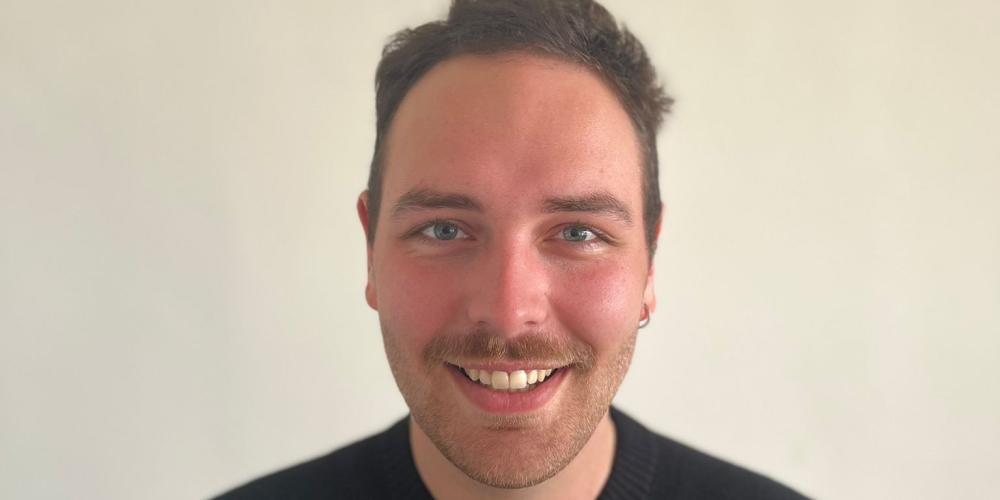
Wout Vanhelden has been elected as president of the student council for the academic year 2024-2025. After an active student life, he now takes on a role in shaping VUB policy. “We want to adopt a freethinking approach to determine what students genuinely find important, regardless of differing groups. It’s about asking: what does the nuanced middle ground think?”
A new president. Who are you, and what are you studying?
“I’m 24 years old. I started with Political and Social Sciences, but I didn’t finish that bachelor’s degree. Now I’m studying Social Work. I’ve always been active in student life: I was president of the Limburgia student society, and later of KEPS. It’s been quite a journey, though my studies didn’t always reflect that.
Now, I’m focusing on more serious matters within the student council. My previous collaboration with them while drafting the guidelines for initiation ceremonies went very well. That made me decide to get to know VUB from a policy perspective.”
What are the main priorities of the new student council?
“We really want to focus on visibility so that students become more engaged with the policies, and we can address key issues. This could be something very practical, like the lighting on campus. For instance, we’d like to start a project where we walk around campus with students at night to identify problems. This shows how we want to involve the average student and understand their priorities. We aim to act as a mediator between the students and the administration.
Additionally, we’re looking at reforms within the university. VUB is working on a new governance structure, and we need to see how we can best continue to represent students within that framework. This may be less exciting, but it’s essential. The student council is involved in many boards and committees because student representation is very important at VUB. But we want to ensure that it remains manageable. Sometimes, we attend meetings where nothing relevant to us is discussed, yet we sit there for two or three hours. Can we combine these meetings? Can we avoid duplicate efforts? This would help reduce the workload.”
Besides all those meetings, what practical steps are you taking?
“We want to meet, speak with, and listen to students. In this way, we aim to influence VUB policy in an inclusive and social manner, always with the students’ interests at the centre. We do this by setting up various committees that reflect student opinions: innovation, education, student services, internationalisation. We constantly ask ourselves: what projects can we start to ensure that the students’ voice is heard? How can we, like with the initiation guidelines, make the student community more inclusive and safer?”
You represent all students, but there’s a great deal of diversity among them, even in terms of political views. How do you handle that?
“We notice this, for example, in the Israel-Palestine debate. There are vocal groups that stand in stark opposition to each other, but there is also a large, nuanced middle ground. For us, it’s crucial to listen to all voices with an open mind. We want to adopt a freethinking approach to determine what students truly care about, regardless of the different groups. It’s about asking: what does the nuanced middle ground think?”
Inclusivity is a noble goal, but is VUB accessible enough for people with disabilities? The buildings, for instance, can be difficult to access.
“The older infrastructure at VUB clearly comes from a time when accessibility was less of a priority. Accessibility for people with disabilities is lacking in the older buildings. Likewise, gender-neutral toilets were unheard of back then. These are important areas for the student council to address. The current zeitgeist is different. Together with the facilities department, we are exploring what can be done. VUB is already doing well in this regard with its newer buildings, where accessibility has been a major focus. We certainly encourage the renovation of older buildings, but we also have to be realistic: in these times of tight budgets, the money isn’t always there.”
What’s your view on the university as a ‘brave space’?
“For me, the student council is definitely a body that strongly supports that ‘brave space’ concept the rector mentioned during the Festival of the Open Mind. It’s a place where discussions happen and where people with strong opinions come together to defend their views. They often do so because they want to represent a particular community or group.
But it’s also our role as a student council to create safe spaces for students who find it difficult to engage in dialogue. We want to create a welcoming and warm campus where people can come together. And from that sense of community, new dialogues and insights can emerge. It’s about combining both approaches.”*
* "This is a machine translation. We apologize for any inaccuracies."
Would you like to follow the Student Council? Here’s where you can find them:
- Student Council VUB on Facebook
- Instagram: @studentenraadVUB
- All meeting reports are available on the public SharePoint: VUB SharePoint Student Council